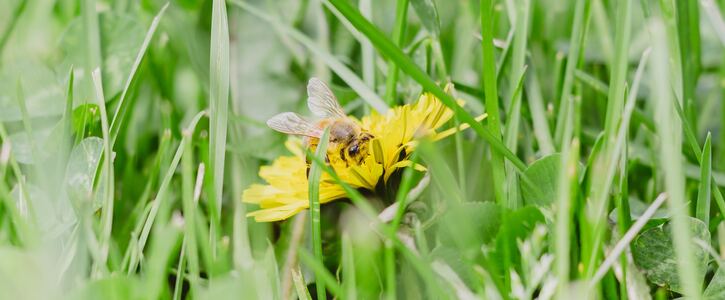50 signatures reached
To: Dublin City Council
Call for DCC to take part in #NoMowMay

Not mowing in May provides a nectar-rich habitat for bees, butterflies & other pollinators early in the season, when they need it most.
Why is this important?
We're calling for Dublin City Council to take part in #NoMowMay and cease mowing the grass of parks and green spaces during the month of May to support wildlife.
Why DCC should take part in #NoMowMay:
- Pollinators, like bees and butterflies, are the backbone of a healthy ecosystem. They rely on early flowering plants such as daisies, dandelions, and other wildflowers as a valuable source of nectar.
- The longer grass provides welcome cover for foraging wildlife such as birds and hedgehogs, as well as a wide variety of insects to snack on.
- A healthy lawn with long grass and wildflowers can help in the fight against climate change by absorbing pollution and locking carbon away in the soil.
Dublin City Council has signed up for the All-Ireland Polinator Plan which recommends reducing mowing to 5 times a year (Once in mid April and then not again until end of May) but this clearly is not being observed. The All-Ireland Pollinator Plan notes reducing mowing as the most cost effective and impactful way to provide food for pollinators and other insects.
Visible improvements have been made by DCC in parks around the city to encourage biodiversity and this is welcomed and appreciated! All we ask is that DCC ease up on mowing wherever possible to give our vital pollinators the best chance at survival.
Further reading:
Why bees matter? Bees are the most important pollinator of crops and native plant species in Ireland. They are a key component of our wildlife and one of the busiest, least appreciated work forces we have. A study from the Department of the Environment found that bees are worth €53m a year to the economy. In Ireland crops such as apples, strawberries, raspberries, tomatoes, blackcurrants, peppers, courgettes and pumpkins are reliant on bees for pollination. It is estimated that almost three quarters of our wild plants rely on insect pollinators, of which bees are most important.
But bees are declining at a record level in Ireland. Due to habitat loss and the use of pesticides more than half of Ireland’s bee species have undergone substantial declines since 1980. The distribution of 42 species has declined by more than 50%. (Source: pollinators.ie)
All-Ireland Polinator Plan: https://pollinators.ie/no-mow-may/
All-Ireland Polinator Plan for councils: https://pollinators.ie/wordpress/wp-content/uploads/2018/05/Councils_actions-to-help-pollinators-2018-WEB.pdf
Why DCC should take part in #NoMowMay:
- Pollinators, like bees and butterflies, are the backbone of a healthy ecosystem. They rely on early flowering plants such as daisies, dandelions, and other wildflowers as a valuable source of nectar.
- The longer grass provides welcome cover for foraging wildlife such as birds and hedgehogs, as well as a wide variety of insects to snack on.
- A healthy lawn with long grass and wildflowers can help in the fight against climate change by absorbing pollution and locking carbon away in the soil.
Dublin City Council has signed up for the All-Ireland Polinator Plan which recommends reducing mowing to 5 times a year (Once in mid April and then not again until end of May) but this clearly is not being observed. The All-Ireland Pollinator Plan notes reducing mowing as the most cost effective and impactful way to provide food for pollinators and other insects.
Visible improvements have been made by DCC in parks around the city to encourage biodiversity and this is welcomed and appreciated! All we ask is that DCC ease up on mowing wherever possible to give our vital pollinators the best chance at survival.
Further reading:
Why bees matter? Bees are the most important pollinator of crops and native plant species in Ireland. They are a key component of our wildlife and one of the busiest, least appreciated work forces we have. A study from the Department of the Environment found that bees are worth €53m a year to the economy. In Ireland crops such as apples, strawberries, raspberries, tomatoes, blackcurrants, peppers, courgettes and pumpkins are reliant on bees for pollination. It is estimated that almost three quarters of our wild plants rely on insect pollinators, of which bees are most important.
But bees are declining at a record level in Ireland. Due to habitat loss and the use of pesticides more than half of Ireland’s bee species have undergone substantial declines since 1980. The distribution of 42 species has declined by more than 50%. (Source: pollinators.ie)
All-Ireland Polinator Plan: https://pollinators.ie/no-mow-may/
All-Ireland Polinator Plan for councils: https://pollinators.ie/wordpress/wp-content/uploads/2018/05/Councils_actions-to-help-pollinators-2018-WEB.pdf

